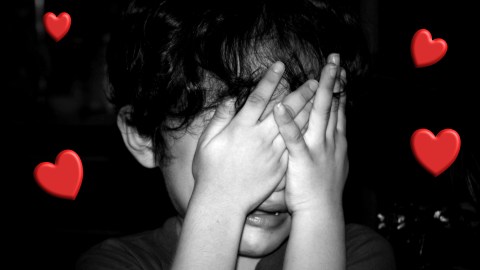Is Valentine’s Day at an elementary school a good idea?

Every year about this time, it’s the same thing for parents of young grade-school students: Time to buy a box of cheap Valentine’s Day cards for everyone in their child’s class so that no child gets more, or less, declarations of love than anyone else. Of course, it’s love of the most insincere kind, since not everyone in an elementary school class likes, much less loves, each other. Why do we put children and their parents through this? Tradition? The kids’ understanding of love is years, in some cases decades, off in the future. Sharing valentines with family members and close friends outside of class clearly teaches them about communicating affection, but in a classroom setting, you have to wonder what if there’s any point at all.
It’s worth noting that there are people who consider the “card for everyone” policy to render the holiday meaningless for the sake of political correctness. They, of all people, should want to leave impressionable little ones out of the romance sweepstakes. Others, such as Roo Ciambirello writing for BabyCenter note, “Well, okay… I guess. Yes, our kids are going to face disappointments, baseball game losses, hurt feelings, and broken hearts. Does this mean we should be actively pursuing ways to tear them down?” But this gets us back to the basic question: Why do we do Valentine’s Days in grade school at all?
Here’s the math: There are 29,980,000 students in U.S. public elementary schools, where the average class size is 25 students. That’s close to 750 million cards distributed in U.S. public grade schools each February 14th. On the surface, it’s an interesting message to send our children as we train them to be more environmentally conscious. Kids: Reduce your waste stream — also, here are 750 million paper cards to recycle.
It’s certainly a big business for card companies. The Paw Patrol cards above are medium-priced at $7.50 online. At one such bag of cards per student, that’s a gross take of $224,850,000 for these companies. One might want to add to that the candy makers, too, though for grade-school kids, we’re not talking pricey velvet hearts packed with chocolates so much as bags of chalky, homily-printed “conversation hearts,” priced at about $2.50 per bag.
So What does Valentine’s Day do for little kids? Does it impart a lesson of any value at all?
The meaning of Valentine’s Day for older kids and adults is pretty clear. It’s the day when you get to graduate from secret admirer — or stalker, depending on the recipient’s own feelings — or the day no one loves you, everyone loves you, or simply the day you’d better get your partner something if you know what’s good for you. It’s a Cupid-designed obstacle course to many and a genuine Day of Love for the lucky few.

Site of St. Valentine’s Day massacre (Chicago Crime Scenes)
Some experts suggest this challenging nature of the grownup holiday is the best reason for little children to experience it. It gives them a chance to get acclimated and ready for later years’ Valentine’s Days, much the way you’d prepare them for doing their own laundry someday, or death.
For older kids and teenagers, of course, celebrating Valentines Day does make sense, possibly moreso than for adults, even. It’s the age, after all, of crushes, passionate romance won and lost, and love or something like it is on a lot of teens’ minds anyway. Valentine’s Day offers a chance to replace the musky aroma of hormones with candy- and flowers-scented declarations of love.
But back to our little children, those tender, manic little characters so full of emotion and so hungry to learn. There better ways to use classroom time. And they’ll have plenty of time later to learn to fake their feelings.
Seriously, love is great — it makes the world go round. But this is not about love. This is about an apparently pointless grade-school tradition that should be reconsidered. We might want to stop putting young hearts and their parents through this. (If you’re sending your child to school with Valentine’s candy, don’t forget about peanut allergies.)





